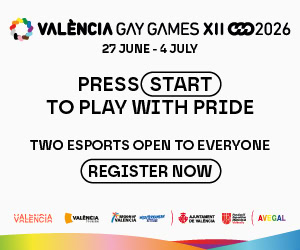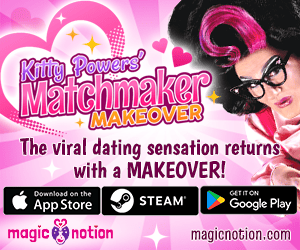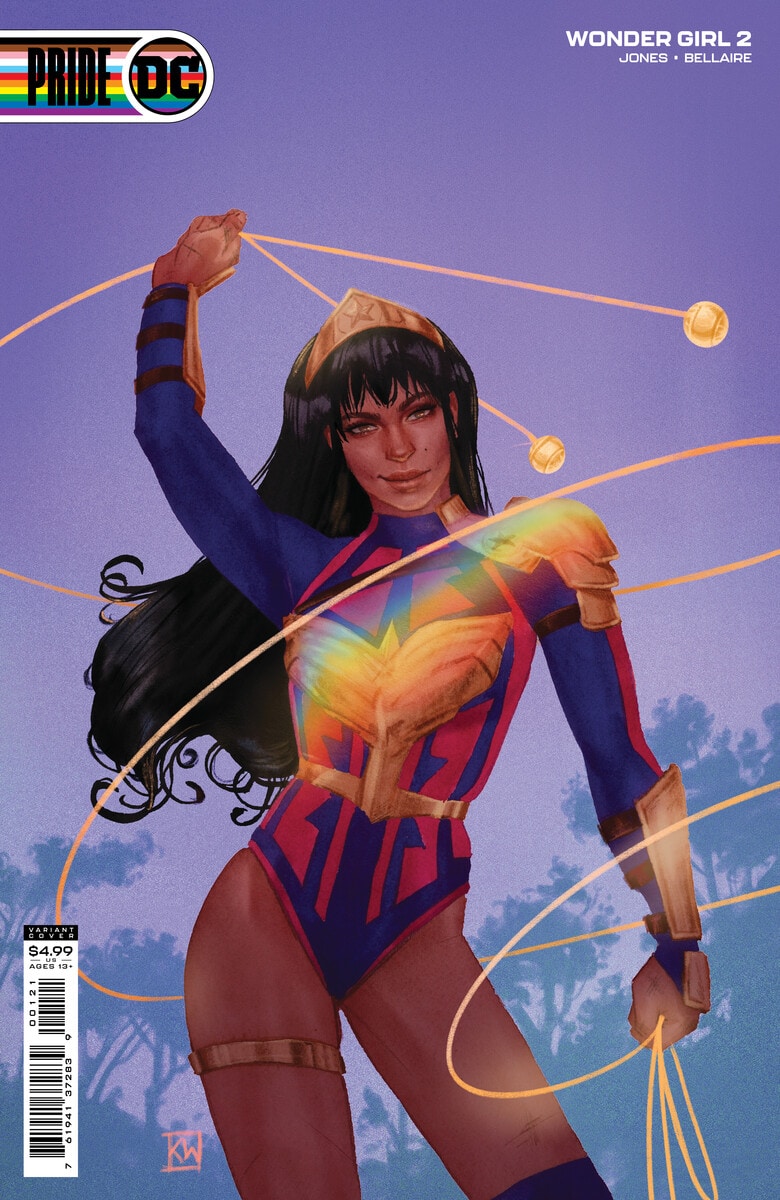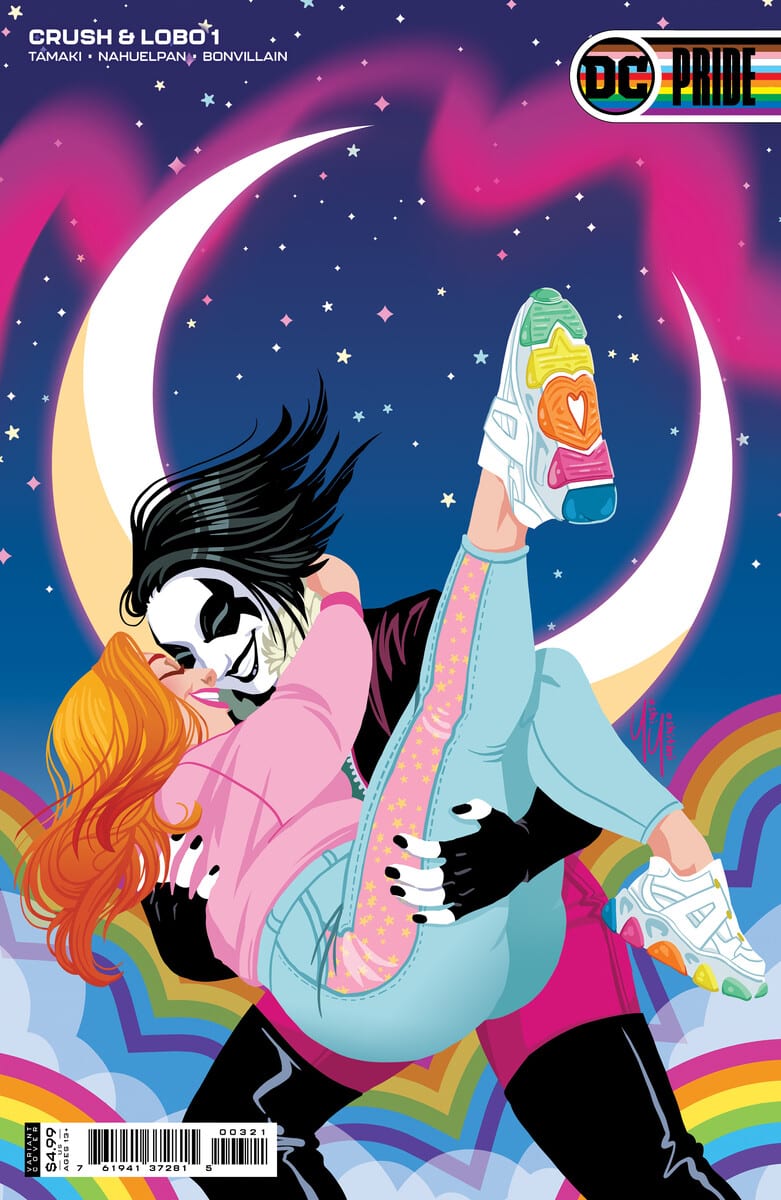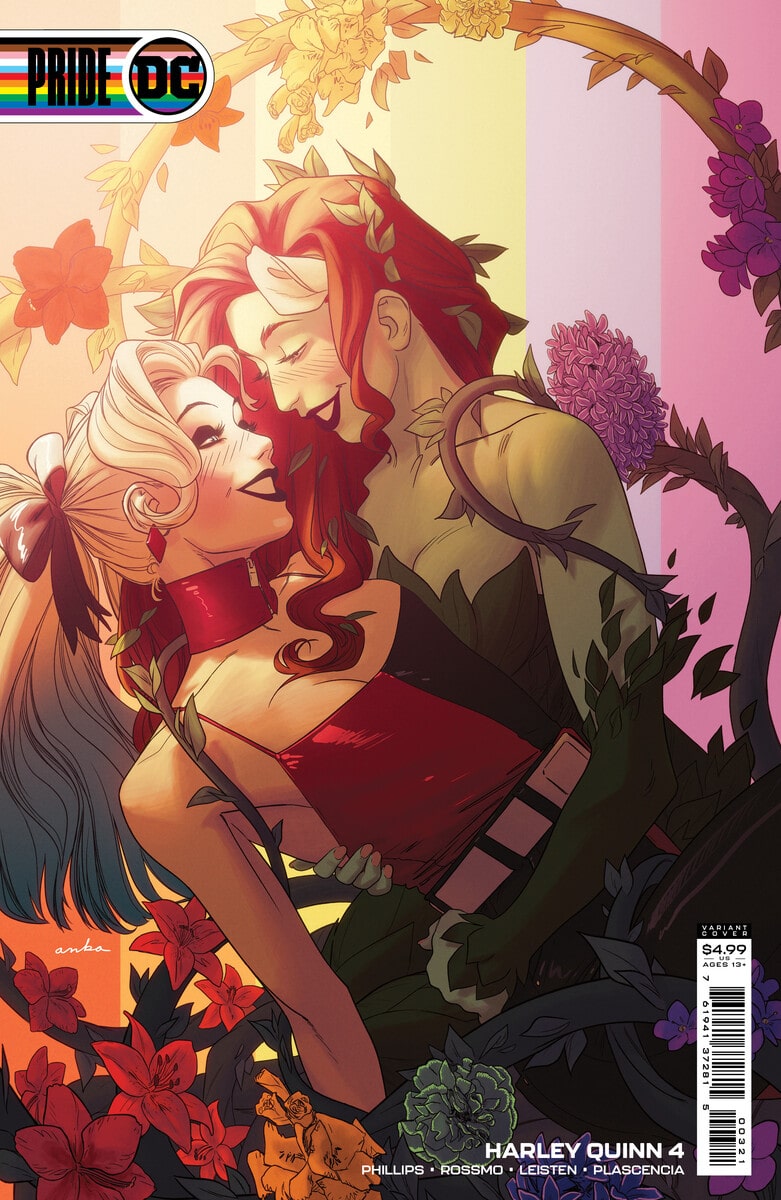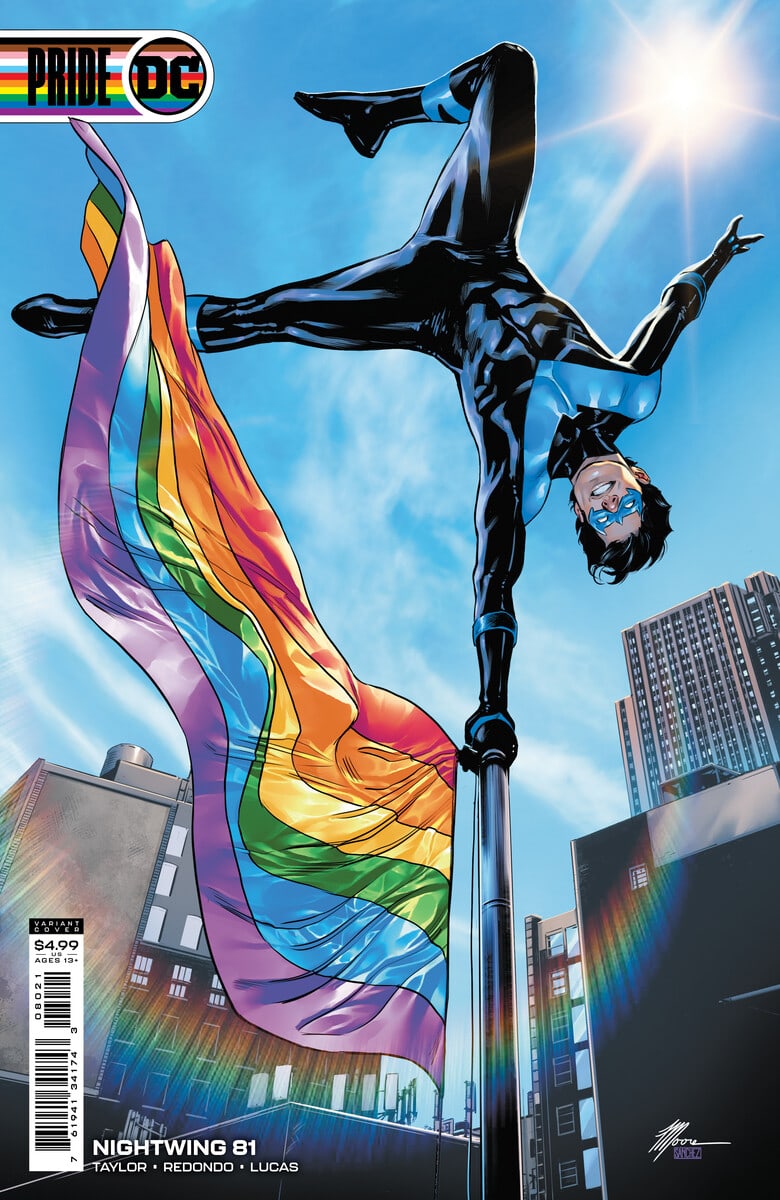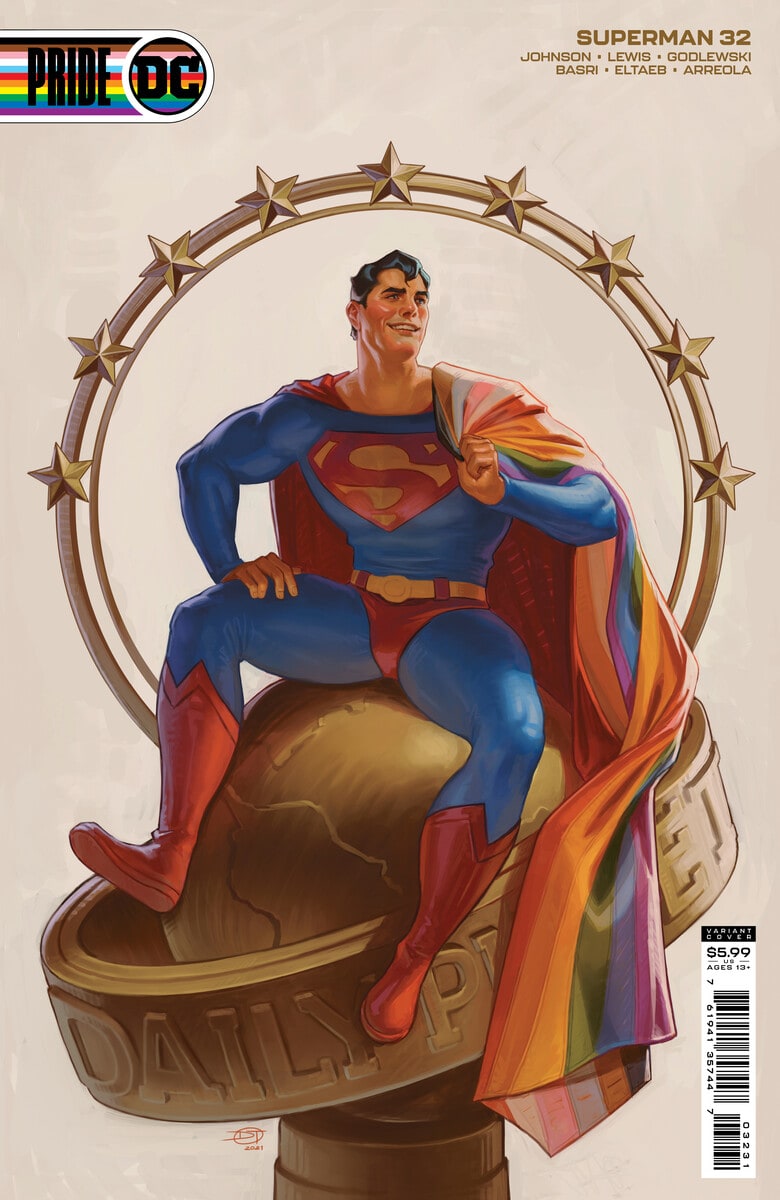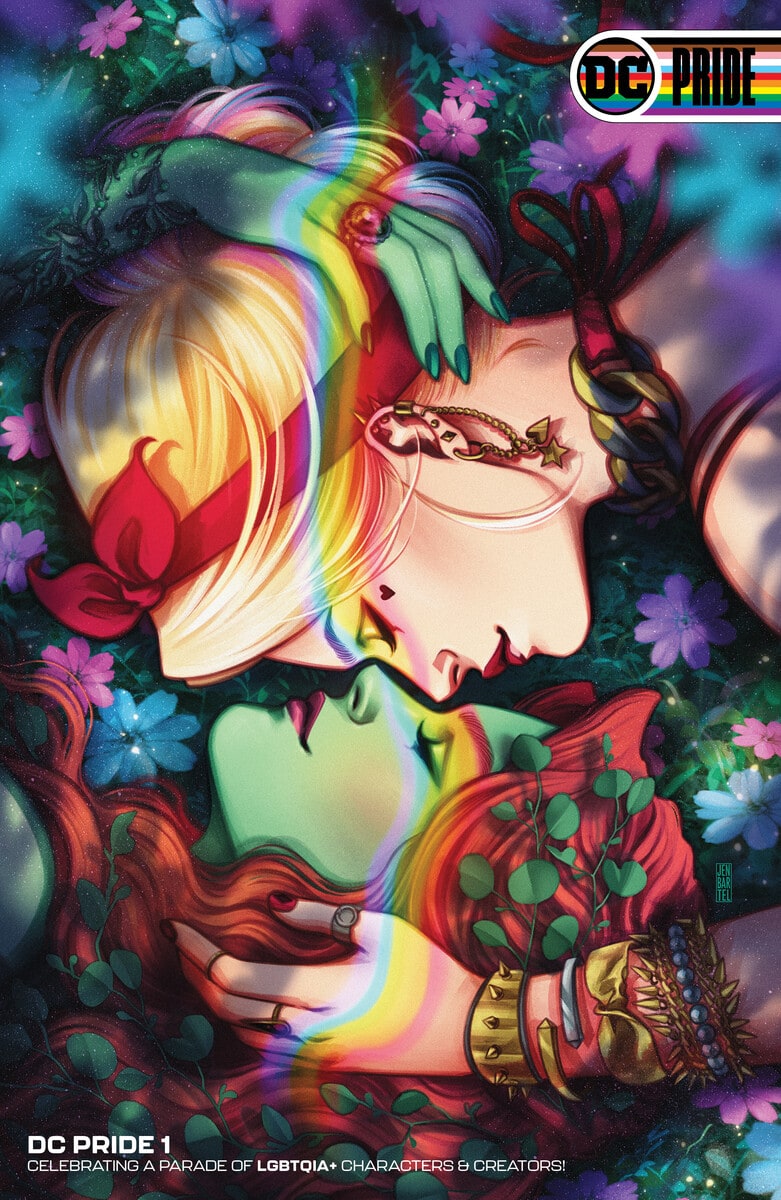
Comics Corner – A Good Week for Gay Superheroes
Sometimes, the comics publishing world goes weeks without any notable developments for LGBTQ+ characters – or readers. Others, there’s a welcome cavalcade of developments on the queer comics front. This is one of those weeks, with several developments at multiple publishers that any queer reader should be excited by.
At Marvel, the launch of X-Men spinoff title Children of the Atom brings with it a quintet of new teen heroes, modelling themselves after the adult X-Men.However, the young team have chosen not to join other mutants on Krakoa – the new island home of all Marvel’s mutants – and are instead operating as would-be superheroes in New York. Interestingly, the series is pitched as as the X-Men equivalent of Young Avengers, with the characters introduced as fans of and would-be sidekicks to the more established mutants – and with names like Cyclops-Lass, Daycrawler, Cherub, Marvel Guy, and Gimmick, it’s pretty clear who they’re each stanning over.
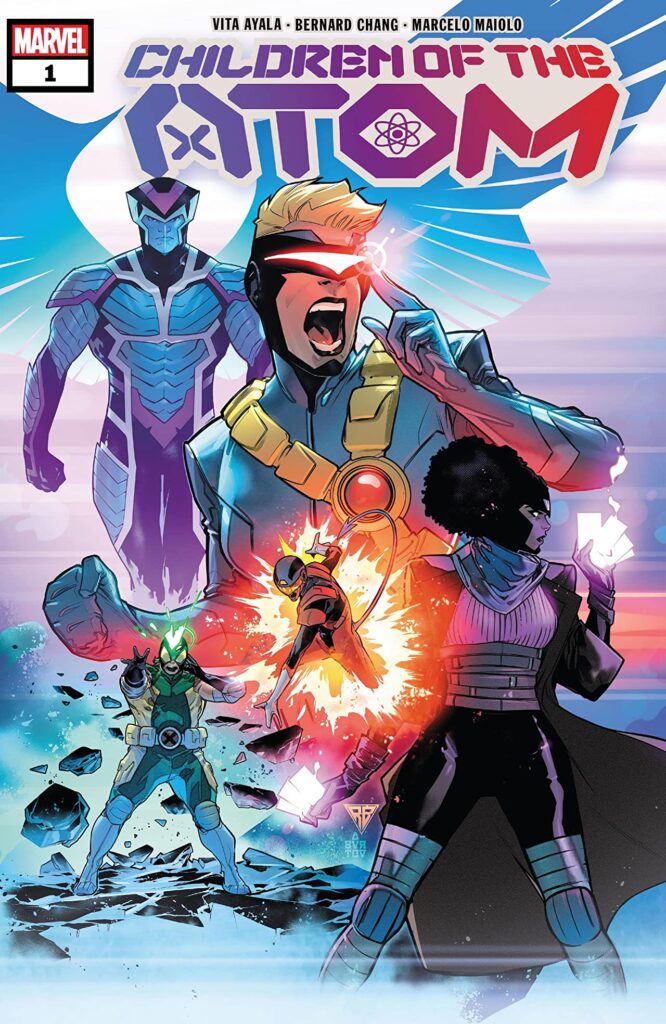
Modern teen superhero comics are nearly always a trove of LGBTQ+ representation – the process of change and experimentation people going through during teenage years fitting nicely with coming out narratives, blended with the metaphorical changes of gaining superpowers that only comics can provide. Children of the Atom is shaping up no differently, and although the first issue doesn’t have anyone explicitly established as queer, it’s pretty transparent in laying the groundwork for future reveals.
The most likely candidate so far is Cyclops-Lass. Despite a civilian name of Beatrice Bartholomew, they prefer to be called “Buddy”, and dresses in a more typically masculine fashion out of costume – a pullover sweater on top of a smart shirt, neat trousers, and wears their hair short and whipped back, with shaven sides. Later in the issue, as the team are changing into their superhero outfits, Buddy is shown to be wearing what is possibly a very tight sports bra, but – we think – more likely a chest binder. Factor in that much of the comic is narrated by Buddy’s internal monologue, discussing always feeling like an outcast until they “found my people”, and Cyclops-Lass seems a solid contender for some trans or genderqueer representation. They may also be neurodivergent, at one point reflecting that they have “always had trouble relating to other people”.
We may be getting ahead of ourselves here – after all, nothing is outright stated in the issue, and no labels are used – but make no mistake, a trans team leader in a mainstream Marvel comic would be an absolutely huge win for representation. For LGBTQ+ readers, Buddy’s identity is going to be just as big a draw for the title as the central mystery – why the kids seemingly can’t join their fellow mutants on Krakoa. Could the core concept of the team as X-Men fans be more literal – non-mutants in superhero cosplay, gaining their abilities from other sources?
The launch of Children of the Atom has been a difficult one – it was originally set for release a year ago, but was delayed due to the COVID crisis. It was then further held up by creative changes, as it would no longer line up with the rest of the X-Men publishing line. However, writer Vita Ayala and artist Bernard Chang deliver a compelling first issue here, with hooks on both the superhero and the character fronts that will have readers coming back in future.
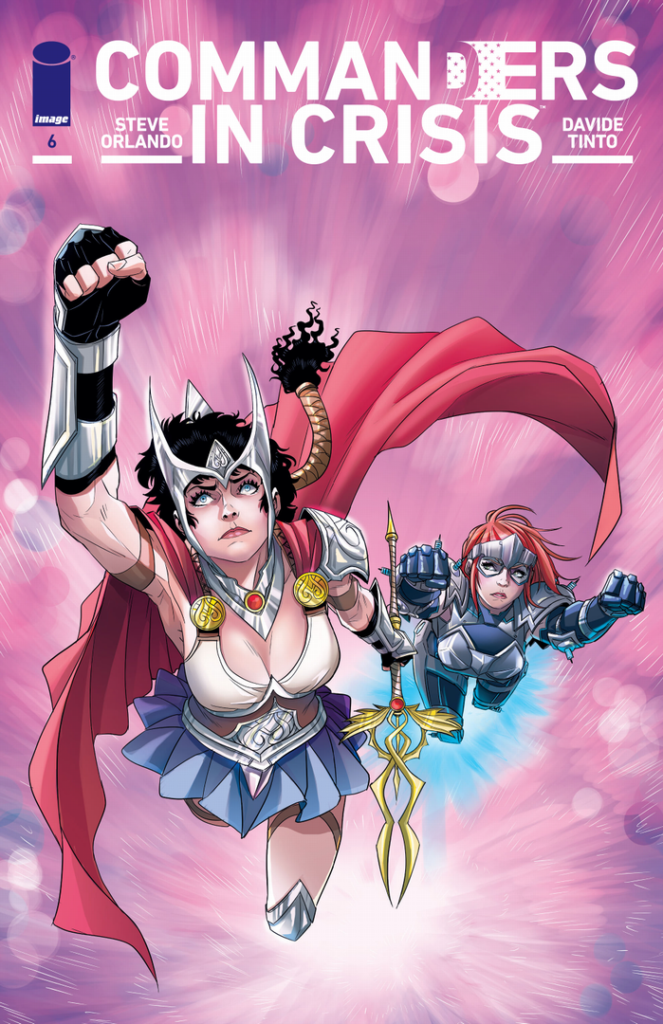
Over at Image, writer Steve Orlando and artist Davide Tinto’s Commanders in Crisis reaches the midpoint of its 12-issue run. An homage to the massive superhero crossover events at Marvel and DC – think Crisis on Infinite Earths or Civil War – the series has followed a team of multiversal refugees, each the last survivor of their home Earths, stranded on the last Earth remaining and trying to save it from the destruction that claimed their own. The twist – each was also the President of the USA in their native reality.
The series has been a delight for fans of the genre, with knowing winks to and subversions of superhero tropes, but it’s increasingly shone for its gay and queer representation as the issues have gone by. The hero Prizefighter was the first gay President on his world, and has been shown to both still be mourning his late husband and maintaining a physical quasi-relationship with reporter Chris Cantero, the Lois Lane to his Superman.
The first half of Commanders in Crisis has largely dealt with the death of empathy itself – the actual concept, murdered in physical form. It’s a brilliantly high concept idea, but also provided a space for the characters to explore their own motivations, and how to convey to an increasingly cynical and divided public that you should care for each other. In #6, that reflection has led Seer – the first Black woman President on her Earth – to reveal that she hid a one-time female lover to deflect from political attacks she sustained for marching in a Pride parade. Other subplots have established that this Earth’s first superheroes, Madame Fury and Hack – masked 1930s crimefighters in the mold of The Shadow or The Green Hornet – were in fact each other’s “beards”, each helping the other in hiding their sexuality. Orlando questions the conventional wisdom that this had to be done because of the period, and asks instead how many more lives could they have changed had they been – or been able to be – open at the time.
Commanders in Crisis has proved to be a masterclass in making queer identities and relationships central, while still delivering a big, mind-bending cosmic superhero story packed with bending realities and wild ideas. At the halfway point, this promises to get even weirder – and hopefully gayer – by the end of its 12-issue run.
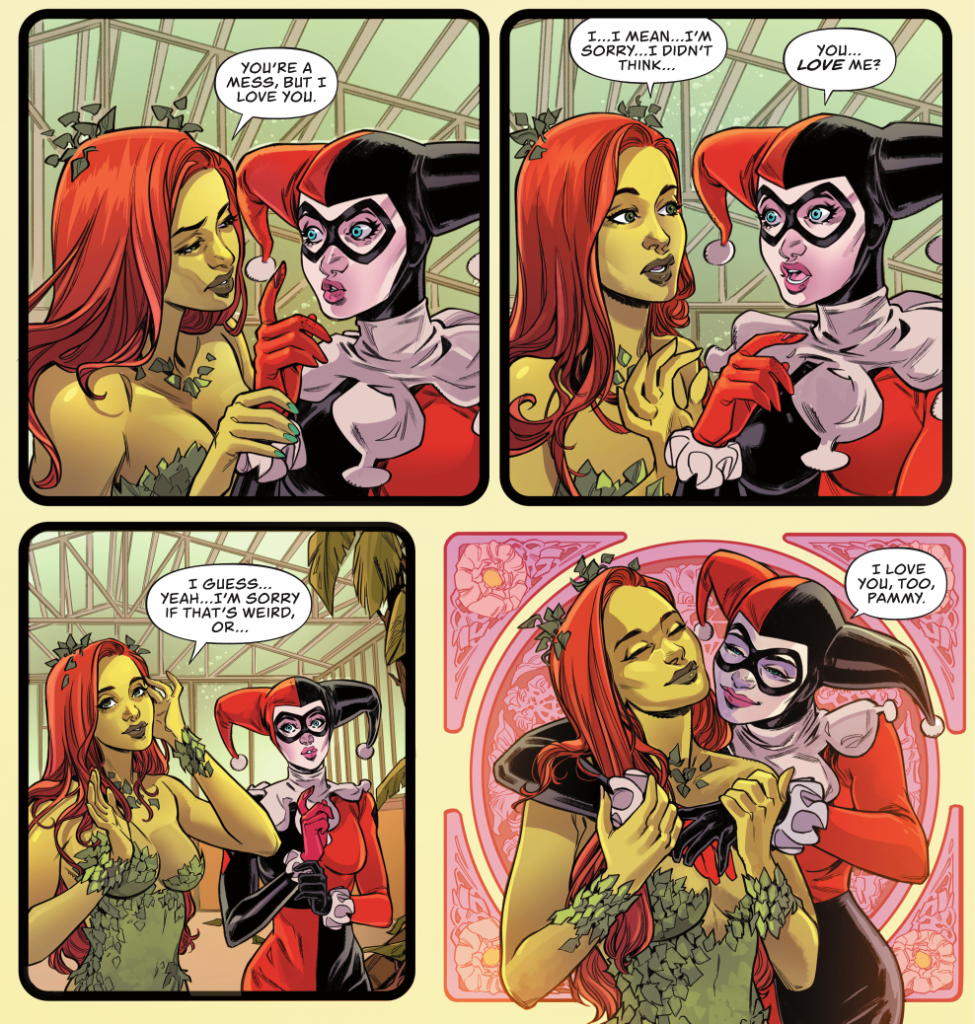
DC, meanwhile, has a double-header of good news for LGBTQ+ readers this week. In Batman: Urban Legends #1 – a new anthology title centred on the Dark Knight and his expanded family of allies and enemies – a Harley Quinn short paints a promising picture for Harley’s relationship with Poison Ivy. In an eight-page story by writer Stephanie Phillips and artist Laura Braga, Harley reflects on her past with Ivy and contemplates their future. It’s a short prelude to the upcoming new Harley Quinn ongoing series – also by Phillips, set to be joined by Riley Rossmo on art – that sees Harley and Ivy outright say “I love you” to each other, and share a passionate kiss.
The pair’s romance has been dodged and danced around by DC for years now – from describing a statue of the pair embracing as them being “friends”, to reportedly not allowing writer Sam Humphries to use Ivy when he was writing the Harley Quinn comic, to most recently having Harley declare her love for Ivy in the 2019 mini-series Harley Quinn and Poison Ivy, but Ivy not reciprocating (she was evil and insane at the time, it happens).
However, with the Harley Quinn animated series more firmly establishing the pair as a romantic couple, and the recent Valentine’s Special showcasing the women as having lived an entire life together, it seems DC is finally ready to allow this relationship to blossom in the ‘main’ continuity. We’ll find out more when Phillips and Rossmo’s new Harley Quinn series launches 23rd March, but this week’s short definitely plants the seeds.
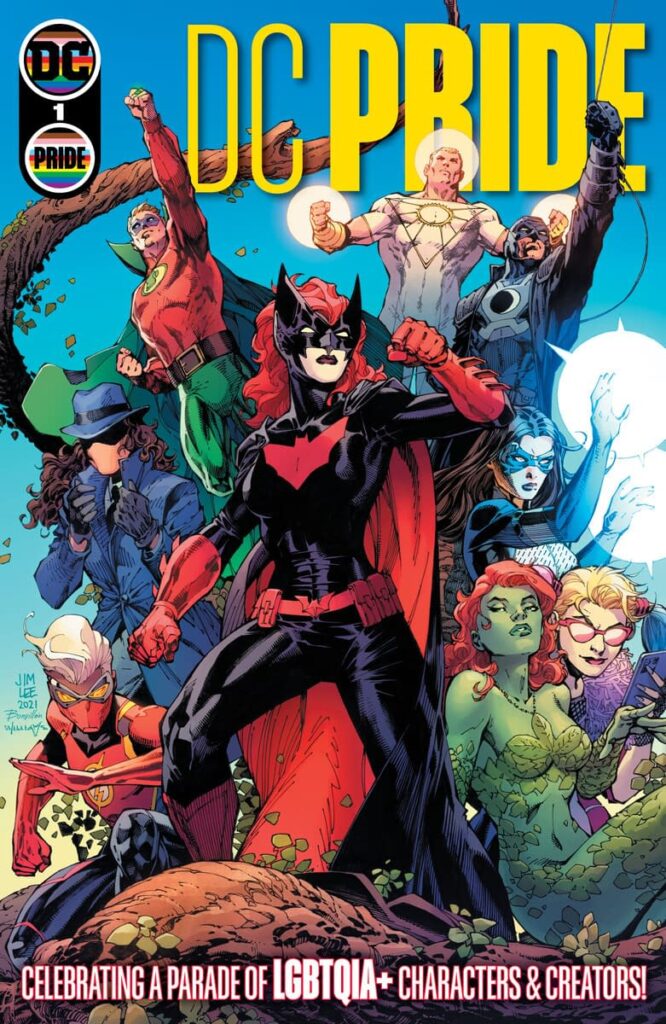
Finally, DC has also announced plans for a DC Pride anthology for June – coinciding with Pride Month in the US. The 80-page title will feature stories by LGBTQ+ creators focussing on DC’s growing roster of LGBTQ+ characters, past and present, including:
Batwoman (Kate Kane) by James Tynion IV & Trung Le Nguyen
Poison Ivy & Harley Quinn by Mariko Tamaki & Amy Reeder
Midnighter by Steve Orlando & Stephen Byrne
Flash of Earth-11 (Jess Chambers) by Danny Lore & Lisa Sterle
Green Lantern (Alan Scott) & Obsidian by Sam Johns & Klaus Janson
Aqualad (Jackson Hyde) by Andrew Wheeler & Luciano Vecchio
Dreamer by Nicole Maines & Rachel Stott
Renee Montoya by Vita Ayala & Skylar Patridge
Pied Piper by Sina Grace, Ro Stein & Ted Brandt
Several of these stories have us particularly excited. Following the recent outing of Green Lantern, a story exploring the dynamic between him and his also-out gay son Obsidian promises to be something we’ve never seen in mainstream superhero comics before, while the Jess Chambers Flash story will be the first real solo focus the non-binary hero will have seen. The Pied Piper story is a deserving spotlight for DC’s first openly gay male character, while the Dreamer short will introduce the trans woman superhero from the Supergirl TV show into the core DC Universe, and will be written by the character’s actress, Nicole Maines.
The DC Pride season will also feature a host of LGBTQ+ themed variant covers for other titles (see gallery, above), either spotlighting queer characters – with Harley and Ivy getting two distinct variants, showing DC really is willing to commit to their being together, at last – or showcasing allyship through established-straight characters, such as Superman with a progressive Pride flag, and Nightwing with a classic Pride flag. DC is also teasing more Pride announcements between now and June, which promises an even more inclusive future for the superhero universe.
All in all, an exciting week for LGBTQ+ comics fans – a rare moment where “our cup runneth over” but, hopefully, just a hint of what’s to come.

